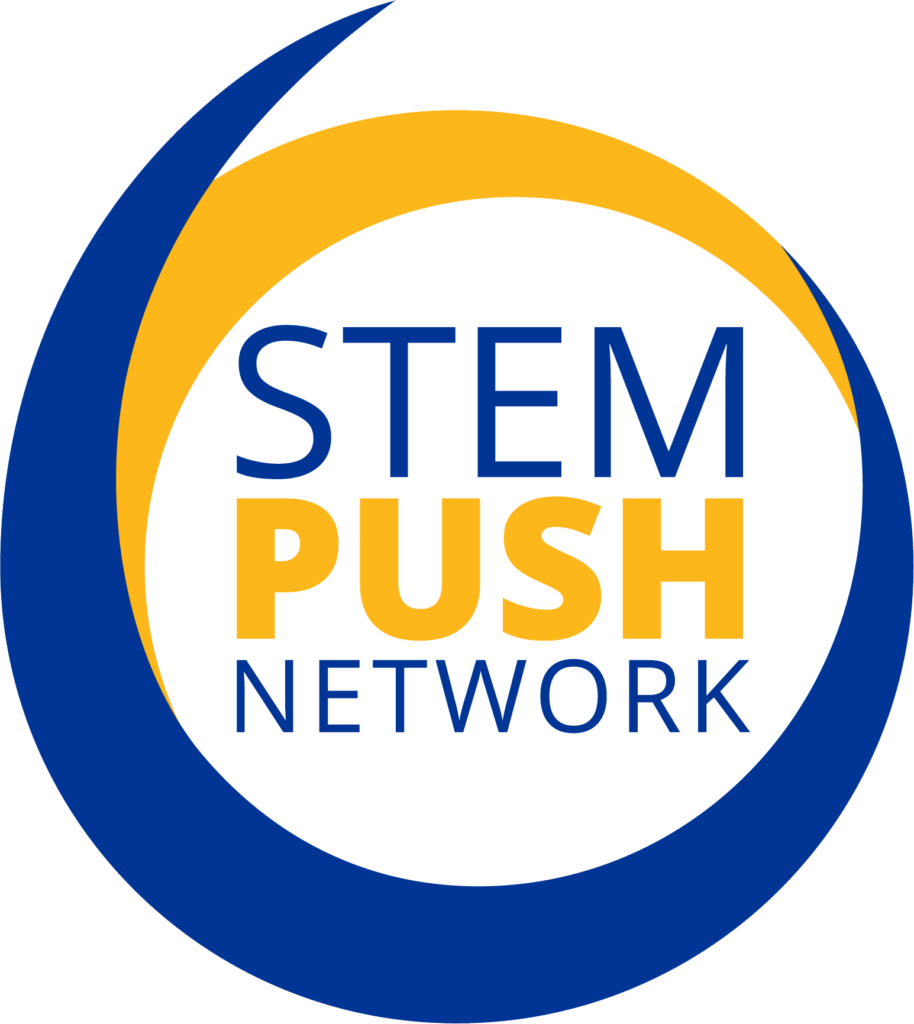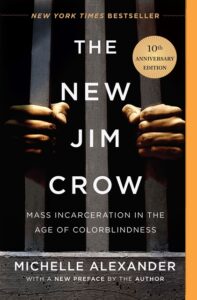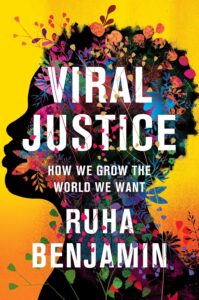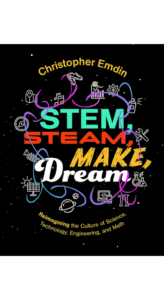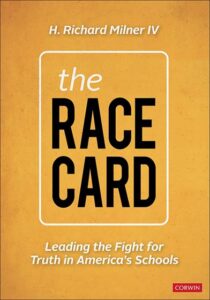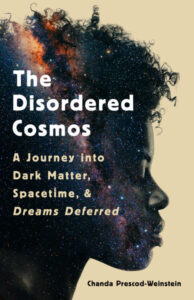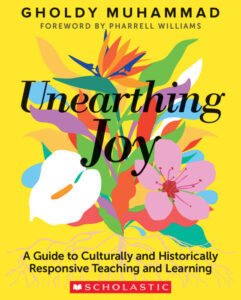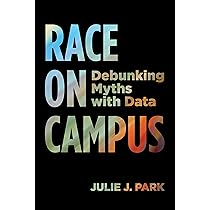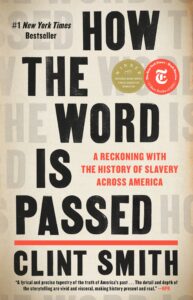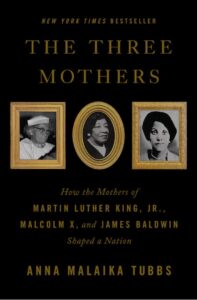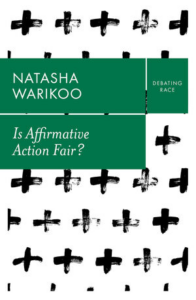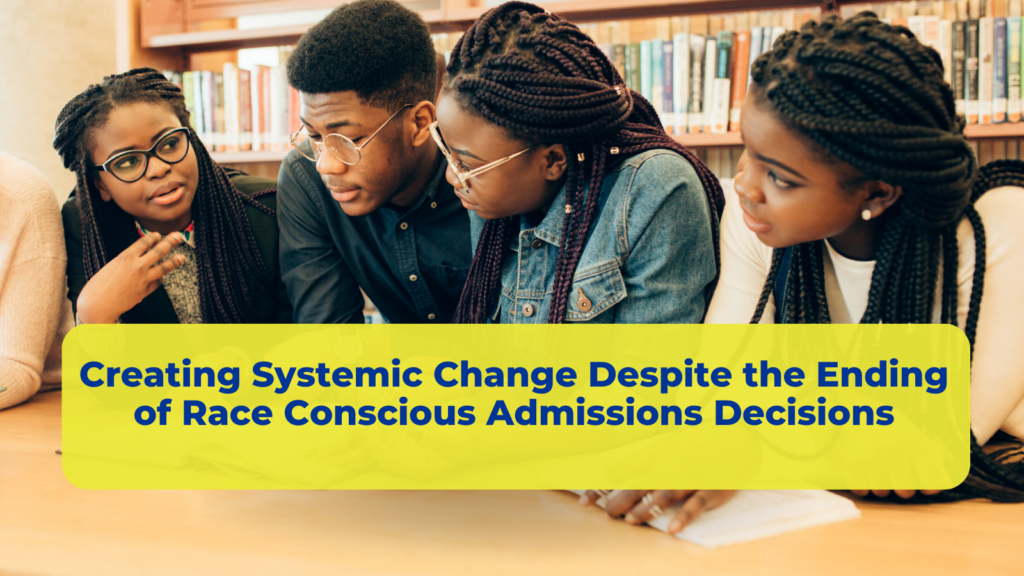STEM PUSH thinks about science, engineering, technology and math – STEM – through the lens of racial equity. Equity is the approach with which the Network reviews all work, processes, learning and research.
With this lens, STEM PUSH involves Network partners in a number of activities to study, reflect on and implement equity-based practices to broaden participation for Black, Latina/o/e, and Indigenous students in STEM. This includes equipping pre-college STEM program (PCSP) leaders with tools to strengthen programs (see what we are learning through our newsletters and improvement packages).
STEM PUSH consistently applies research to validate our theory of improvement and works to scale important ideas. In order to create systemic change and broaden participation in STEM, we know it’s important to understand the historical and cultural context of STEM to make it a more equitable area of study and work.
As STEM PUSH continues to share resources and support pre-college STEM programs leaders in connecting these resources and associated content into their programs, the Network also facilitates the ongoing study of literature that will be useful in the continued pursuit of equity. Book studies help STEM PUSH leaders examine how to make pre-college STEM programs more culturally sustaining for Black, Indigenous and Latina/o/e students. Reading, discussing, and applying texts as a Network community supports program leaders, Hub members, and Ecosystem leadership in learning new concepts, applying them, and looking to collectively change systems.
Here is the latest book list shared at STEM PUSH’s Fall 2023 convening aimed at pushing the Network to get closer to more equity in STEM for Black, Latina/o/e, and Indigenous students.
Alexander, Michelle. (2010) The New Jim Crow: Mass Incarceration in the Age of Colorblindness
Michelle Alexander demonstrates, it is perfectly legal to discriminate against convicted criminals in nearly all the ways in which it was once legal to discriminate against African Americans. Alexander shows that, by targeting black men through the War on Drugs and decimating communities of color, the U.S. criminal justice system functions as a contemporary system of racial control, even as it formally adheres to the principle of colorblindness.
Benjamin, Ruha. (2022). Viral Justice: How We Grow the World We Want
Long before the pandemic, Ruha Benjamin was doing groundbreaking research on race, technology, and justice, focusing on big, structural changes. But the twin plagues of COVID-19 and anti-Black police violence inspired her to rethink the importance of small, individual actions. Part memoir, part manifesto, Viral Justice is a sweeping and deeply personal exploration of how we can transform society through the choices we make every day.
Explore the ways that science, technology, engineering, and mathematics can transform all young people’s lives. This includes reimagining our collective relationship to STEM by presenting it as more accepting and accessible than previously acknowledged. Through an experiential approach, the book articulates the value of dreaming of a future that is inclusive of all young people, especially those furthest from opportunity.
Milner, H. Richard. (2023). The Race Card: Leading the Fight for Truth in America’s Schools
Race neutral leadership is not an option. Education leaders are on the frontline in the fight for racial justice and must co-construct practices to disrupt storylines, policies, and practices that perpetuate opportunity gaps. Drawing from established research and the wisdom of teachers, young people, parents, community members, policy advocates, and school leaders, The Race Card is a guide for frontline leaders at every level to confront and disrupt racism.
Prescod-Weinstein, Chanda (2021). The Disordered Cosmos: A Journey into Dark Matter, Spacetime, and Dreams Deferred
In The Disordered Cosmos, Dr. Chanda Prescod-Weinstein shares her love for physics, from the Standard Model of Particle Physics and what lies beyond it, to the physics of melanin in skin, to the latest theories of dark matter — all with a new spin informed by history, politics, and the wisdom of Star Trek. Prescod-Weinstein urges us to recognize how science, like most fields, is rife with racism, sexism, and other dehumanizing systems. She lays out a bold new approach to science and society that begins with the belief that we all have a fundamental right to know and love the night sky.
Muhammad, Gholdy. (2023). Unearthing Joy: A Guide to Culturally and Historically Relevant Teaching
In this sequel to Cultivating Genius, Gholdy Muhammad adds a fifth pursuit-joy-to her groundbreaking framework. Dr. Muhammad shows how joy, which is rooted in the cultural and historical realities of Black students, can enhance our efforts to cultivate identity, skills, intellect, and criticality for ALL students, giving them a powerful purpose to learn and contribute to the world. Dr. Muhammad’s wise implementation advice is paired with model lessons that span subjects and grade levels.
Park, Julie. (2018). Race on Campus: Debunking Myths with Data
Based on her analysis of extensive research and data about contemporary students and campuses, Park counters these myths and explores their problematic origins. In the course of responding to these myths, Park presents a far more positive and nuanced portrait of diversity and its place on American college campuses.
Smith, Clint. (2021). How the Word is Passed
In a deeply researched and transporting exploration of the legacy of slavery and its imprint on centuries of American history, How the Word Is Passed illustrates how some of our country’s most essential stories are hidden in plain view-whether in places we might drive by on our way to work, holidays such as Juneteenth, or entire neighborhoods—like downtown Manhattan—on which the brutal history of the trade in enslaved men, women and children has been deeply imprinted.
Tubbs, Anna Malaika. (2021). The Three Mothers: How the mothers of MLK, Malcolm X, and James Baldwin shaped a nation
Berdis Baldwin, Alberta King, and Louise Little were all born at the beginning of the 20th century and forced to contend with the prejudices of Jim Crow as Black women. These three extraordinary women passed their knowledge to their children with the hope of helping them to survive in a society that would deny their humanity from the very beginning—from Louise teaching her children about their activist roots, to Berdis encouraging James to express himself through writing, to Alberta basing all of her lessons in faith and social justice.
Warikoo, Natasha. (2022) Is Affirmative Action Fair?: The Myth of Equity in College Admissions
Natasha Warikoo dives into the arguments for and against a policy that has made it to the US Supreme Court many times. She digs into the purposes of higher education and the selection process itself to argue that it is a mistake to equate college admissions with personal merit and reward. Ultimately, Warikoo concludes that a focus on individual fairness conceals much more important questions about justice. No matter what their perspective, readers will find themselves thinking anew and asking the deeper questions that underlie this emotive debate.
